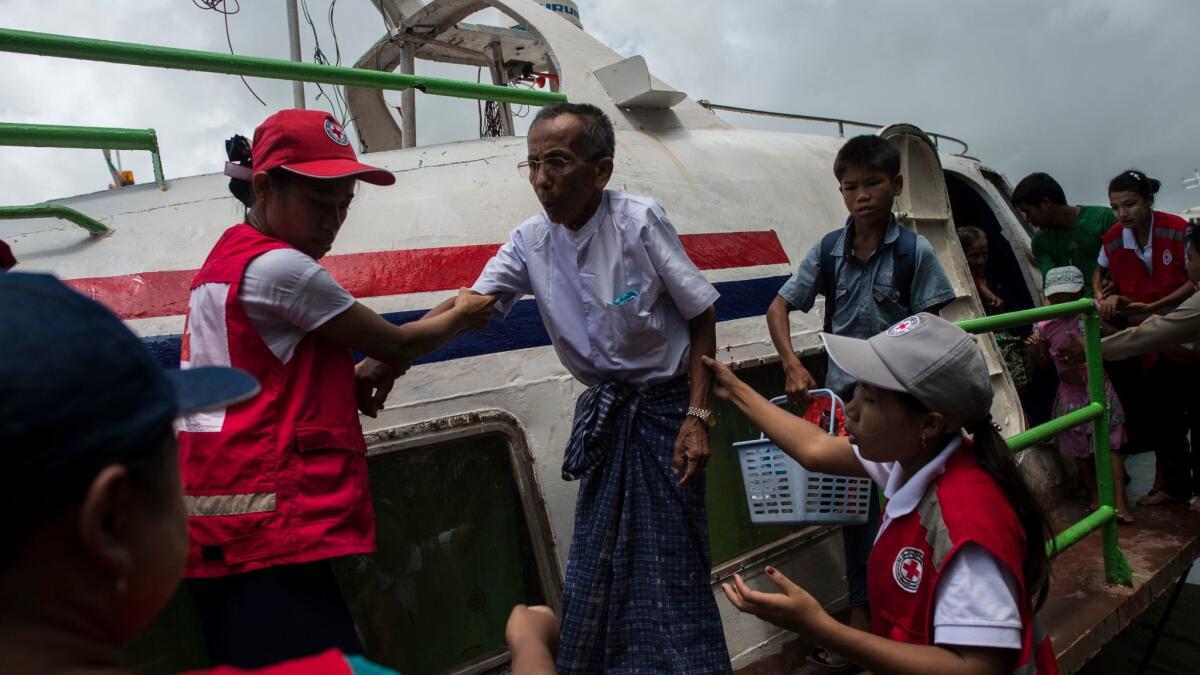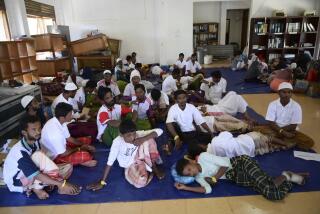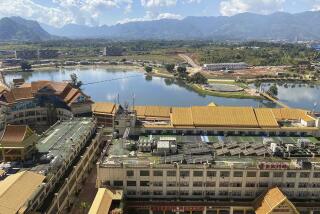18,000 Rohingya flee violence in Myanmar into Bangladesh

At least 18,000 Rohingya Muslims have fled fresh violence in Myanmar and crossed into Bangladesh in less than a week, with hundreds stranded in no man’s land at the countries’ border, the International Organization for Migration said Wednesday.
Sanjukta Sahany, a spokeswoman for the organization in Cox’s Bazar, on the Bangladesh border with Myanmar, released the latest figures as human rights groups and advocates for the Rohingya say the Myanmar army was retaliating for attacks last week by Rohingya militants by burning down villages and shooting civilians.
The government in Myanmar, also known as Burma, blames Rohingya insurgents for the violence, including the arson. Government figures put the death toll since last week at a minimum of 103, including 12 members of security forces, 77 persons described as insurgents and 14 civilians.
Rohingya advocates fear hundreds of civilians may have been killed in army raids.
A report issued Wednesday by Myanmar’s Information Ministry said that 45 improvised explosive devices were detonated and seven villages, one security post and two neighborhoods in the township of Maungdaw burned down on Sunday and Monday.
Maungdaw, in the northern part of Rakhine state, is a center for the violence, though villages over a much wider area were also hit.
A majority of Myanmar’s estimated 1 million Rohingya live in northern Rakhine, where they have faced persecution in the Buddhist-majority country that refuses to recognize them as a legitimate native ethnic minority, leaving them without citizenship and basic rights.
Sahany said the Rohingya crisis was not an issue between Myanmar and Bangladesh but of international concern.
Ali Hossain, Cox’s Bazar district’s top government official, told the Associated Press that their resources were under huge stress after some 87,000 Rohingya entered Bangladesh since October last year and another 18,000 since last Friday.
“I have already informed the government’s high-ups about the trouble we are facing here,” he said. “This is a very complex situation.”
The U.N. refugee organization on Tuesday urged Bangladesh to continue to allow Rohingya fleeing violence to seek safety. It said it was ready to help Bangladesh with assistance for the refugees.
Bangladesh’s Prime Minister Sheikh Hasina on Wednesday requested the United States to put pressure on Myanmar so that its government stops pushing Rohingya toward Bangladesh, said her spokesman.
Hasina made the request during talks with Alice Wells, U.S. acting assistant secretary of State for south and central Asia, said Ihsanul Karim, Hasina’s press secretary.
In another development, police said a boat carrying an unknown number of Rohingya capsized in the Naf River, leaving at least four dead. The boat was trying to enter Bangladesh through Shah Porir Island in the Bay of Bengal when it sank, said police official Main Uddin.
He said they recovered four bodies and “most probably” many others were missing.
“Our search is on. We don’t know how many were on the boat,” he said.
Also Wednesday, Bangladesh’s border guards turned back 171 Rohingya after detaining them at different border points over the last two days, said Col. S.M. Ariful islam, a director of the Border Guard Bangladesh.
He said border guards provided them with food and medicine before pushing them back, but it was not clear what happened to them later.
The insurgent raids last Thursday night were deadlier than an attack by the militants on three border posts last October that killed nine policemen and set off months of brutal counterinsurgency operations against Rohingya communities. Human rights groups accused the army of carrying out massive abuses, including killing, rape and burning down more than 1,000 homes and other buildings.
More to Read
Start your day right
Sign up for Essential California for news, features and recommendations from the L.A. Times and beyond in your inbox six days a week.
You may occasionally receive promotional content from the Los Angeles Times.






